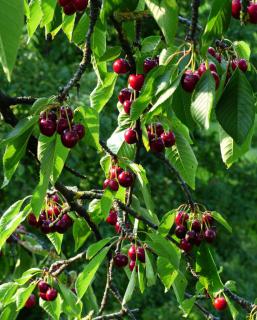

The bigarreau cherry tree produces beautiful cherries, sweet and fleshy and firm, and its productivity is abundant.
Basic Bigarreau Cherry facts
Name – Prunus avium
Family – Rosaceae
Type – fruit tree
Height – 20 to 50 feet (6 to 15 meters)
Exposure – full sun
Soil – ordinary
Foliage – deciduous
Flowering – April
Harvest – June to July depending on the variety
Planting, for this cherry tree variety, is an important step because, if properly performed, it increases growth of the tree, fruit formation and thus the harvest of bigarreau cherries.
This is a topic that is quite divisive, because pruning a Bigarreau cherry tree, whatever the sub-variety, tends to weaken the tree and increases its vulnerability to many diseases.
Nonetheless, it might still be necessary to prune if the Bigarreau cherry tree grows too large, or if certain branches become too weak. Since cherry trees are more vulnerable when pruned, it must be performed as lightly as you can.
Bigarreau cherry tree is a vigorous and fast-growing cherry tree. Certainly among the most commonly grown in temperate climates, it adapts well to most types of soil and climates.
Definitely a consideration when setting up an orchard or adding fruit trees in our gardens, the Bigarreau cherry tree offers many advantages.

If you only plant one specimen, select a self-pollinating variety like ‘Bigarreau summit’ or ‘Bigarreau sweetheart’ for your desserts and preserves.
Finally, if an early harvest is what you are aiming for, prefer the Burlat Bigarreau cherry tree and its bright red and juicy cherries.
Your only option is to plant a self-pollinating variety when there will only be one cherry tree, if not, you won’t have any cherries.
Cherry trees are considered sensitive fruit trees, and pruning must be avoided as much as possible: each wound is an entry point, for fungus especially.
Watch out for the damage that our bird friends can cause.
They can leave devour your harvest in only a few days.